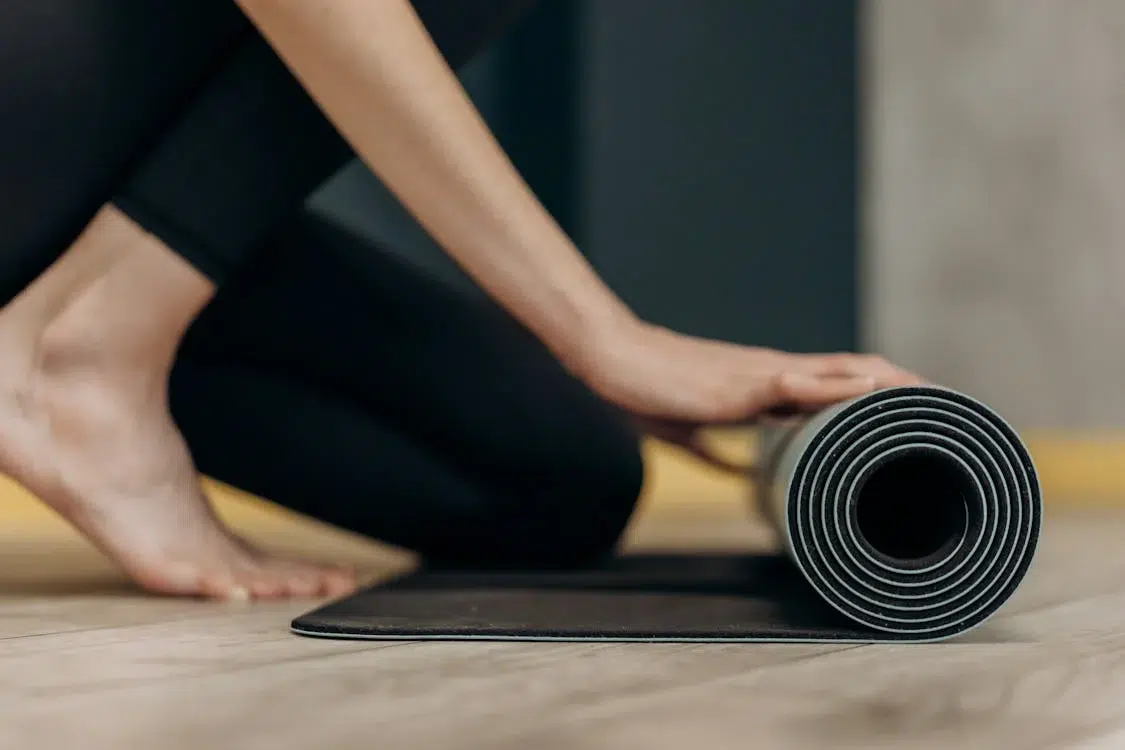Memilih matras yoga grosir untuk pusat kebugaran membutuhkan evaluasi menyeluruh terhadap ketebalan, tekstur, dan daya tahan agar sesuai dengan intensitas dan jenis latihan yang berbeda. Matras dengan bantalan yang cukup akan meningkatkan perlindungan sendi; bahan yang tidak licin memberikan cengkeraman dan stabilitas yang lebih baik untuk posisi-posisi yang sulit. Untuk perusahaan yang membeli dalam jumlah besar, berinvestasi pada bahan yang kuat juga menjamin daya tahan, yang menjamin keekonomisan.

Spesialisasi kami di MODENLY adalah memproduksi dan mendistribusikan tikar yoga grosir premium yang dimaksudkan untuk digunakan di fasilitas kebugaran, guru yoga, dan manajer gym. Memilih matras yoga yang tepat dapat membantu Anda menjamin kenyamanan, daya tahan, dan kinerja bagi pelanggan Anda, baik Anda menjalankan program kesehatan perusahaan, gym besar, atau studio yoga kecil.
Panduan ini akan membahas elemen-elemen utama yang perlu dipertimbangkan saat memilih matras yoga grosir untuk fasilitas kebugaran, sehingga memungkinkan Anda untuk mendapatkan perpaduan ideal antara kenyamanan, umur panjang, dan ekonomis.
Langkah 1: Memahami Ketebalan Matras Yoga dan Dampaknya
Pemilihan matras yoga yang sesuai Membeli matras yoga grosir untuk pusat kebugaran membutuhkan pertimbangan ketebalan. Memastikan bahwa klien mendapatkan pengalaman terbaik bergantung pada ketebalan yang memengaruhi kenyamanan, stabilitas, dan portabilitas. Memilih ketebalan yang tepat membantu meningkatkan perlindungan sendi, keseimbangan, dan daya tahan tubuh, baik jika studio Anda menyediakan Pilates, yoga restoratif, atau latihan intensitas tinggi.
Matras Yoga Tipis (3mm-5mm) - Terbaik untuk Stabilitas dan Perjalanan
Biasanya, matras yoga tipis dengan ketebalan antara 3mm dan 5mm dimaksudkan untuk latihan Ashtanga, Vinyasa, dan Power Yoga yang membutuhkan hubungan dengan lantai yang baik. Mempertahankan stabilitas dalam pose keseimbangan bergantung pada pengguna yang merasakan tanah di bawahnya dan matras ini memberikan dukungan yang kuat. Guru yang bepergian, program latihan keliling, dan lingkungan studio yang multi guna akan merasa cocok dengan matras ini karena ringan dan portabel.
Matras yang lebih tipis, bagaimanapun, memberikan lebih sedikit bantalan, yang tidak akan sesuai untuk pelanggan di lantai keras atau mereka yang memiliki sendi sensitif. Tikar yoga grosir dalam kisaran ketebalan ini dapat membantu studio yang sebagian besar melayani jenis yoga dinamis dan berbasis aliran serta mungkin menjadi pilihan ideal untuk Pilates atau latihan lantai yang lebih lama.
Matras Ketebalan Standar (6mm-8mm) - Ideal untuk Sebagian Besar Studio Kebugaran
Matras yoga berukuran 6mm hingga 8mm adalah perpaduan ideal antara kenyamanan dan dukungan untuk sebagian besar sekolah yoga dan pusat kebugaran. Ketebalan ini menjaga postur keseimbangan tetap stabil namun tetap memberikan bantalan yang cukup untuk melindungi lutut dan persendian. Untuk sesi yoga umum, fasilitas kebugaran serbaguna, dan pusat kebugaran yang menyediakan berbagai latihan berdampak rendah, matras ini bekerja dengan baik.
Matras dengan ketebalan standar adalah investasi yang bagus untuk pembelian dalam jumlah besar bukan hanya karena menyenangkan dan mudah beradaptasi, tetapi juga lebih tahan lama daripada pilihan yang lebih tipis. Memesan matras yoga grosir 6mm-8mm dapat membantu pusat kebugaran yang mencari solusi matras yoga dengan harga terjangkau dan tahan lama untuk melayani spektrum pelanggan yang luas.
Matras Yoga Ekstra Tebal (10mm ke Atas) - Terbaik untuk Perlindungan Sendi dan Pekerjaan Lantai
Studio yang menyediakan Pilates, yoga restoratif, atau latihan berdampak tinggi harus mempertimbangkan matras yoga ekstra tebal-biasanya setebal 10mm atau lebih. Untuk klien yang membutuhkan lebih banyak bantalan untuk latihan lantai atau sesi rehabilitasi, matras ini menawarkan dukungan dan kenyamanan sendi yang luar biasa.
Matras yang ekstra tebal kurang cocok untuk pose berbasis keseimbangan, meskipun mereka meningkatkan penyerapan goncangan, karena mereka juga dapat menurunkan stabilitas. Berat dan kurangnya portabilitas juga berpotensi memengaruhi kebijakan pembersihan dan penyimpanan di pusat kebugaran yang sibuk.
Pilih matras yang tipis (3mm-5mm) untuk koneksi lantai yang lebih baik dalam pose yoga yang berorientasi pada keseimbangan. Matras standar (6mm-8mm) menawarkan perpaduan antara penyangga dan daya tahan untuk kelas-kelas yoga dan kebugaran. Berinvestasilah pada matras ekstra tebal (10mm+) untuk menjamin perlindungan sendi terbaik untuk Pilates, yoga restoratif, dan latihan berdampak tinggi. Ingin tikar yoga PVC yang hemat biaya untuk pesanan massal? Dapatkan penawaran hari ini untuk harga grosir dan kustomisasi!
Langkah 2: Memilih Bahan yang Tepat untuk Daya Tahan dan Kenyamanan
Memilih bahan yang tepat sama pentingnya dengan memilih ketebalan yang tepat saat berbelanja matras yoga grosir untuk fasilitas kebugaran. Semuanya sangat penting dalam menjamin kegunaan jangka panjang dan kebahagiaan pelanggan, bahan mempengaruhi daya tahan, cengkeraman, kenyamanan, dan dampak lingkungan. Apakah studio Anda menghargai keramahan lingkungan, efektivitas biaya, atau kinerja premium, mengetahui kelebihan dan kekurangan bahan apa pun akan memungkinkan Anda untuk memutuskan pembelian grosir mana yang terbaik.
PVC (Polivinil Klorida) - Terjangkau dan Tahan Lama, tetapi Kurang Ramah Lingkungan
Karena harganya yang terjangkau, daya tahan yang baik, dan cengkeraman yang baik, matras yoga PVC adalah salah satu produk yang paling sering digunakan di pasaran. Fasilitas olahraga dengan lalu lintas tinggi yang membutuhkan peralatan yang tahan lama akan merasa cocok dengan matras ini karena tahan terhadap kelembaban, keausan, dan robekan. Selain itu, menawarkan permukaan yang kuat dan tidak licin, matras ini memungkinkan pengguna untuk tetap stabil dalam pose yang sulit.
PVC dianggap kurang ramah lingkungan dibandingkan pilihan lainnya dan tidak dapat terurai secara alami. Meskipun TPE, karet alam, atau matras yoga gabus adalah pilihan yang lebih ramah lingkungan untuk studio yang mencari solusi berkelanjutan, namun ini adalah anggaran yang masuk akal untuk pembelian dalam jumlah besar.
TPE (Thermoplastic Elastomer) - Ringan, Ramah Lingkungan, dan Serbaguna
Karena keunggulannya yang ramah lingkungan, kenyal, dan tahan lama, matras yoga TPE menjadi semakin banyak dicari. Matras TPE, yang dibuat dari bahan yang dapat didaur ulang dan tidak beracun, memiliki rasa yang lebih lembut dan empuk, namun tetap memberikan cengkeraman dan penyangga yang baik. Matras ini sangat ringan, sehingga memudahkan transportasi dan penyimpanan di pusat kebugaran dengan ruang terbatas.
Matras TPE lebih ramah lingkungan daripada PVC, tetapi dalam kondisi lalu lintas tinggi, matras ini sedikit kurang tahan lama. Matras ini sangat cocok untuk perusahaan kebugaran yang mengutamakan keberlanjutan, pusat kebugaran perusahaan, dan butik-butik yoga.
Karet Alam - Performa Tinggi dan Cengkeraman Unggul
Guru yoga profesional dan fasilitas kebugaran kelas atas sangat menyukai matras yoga dari karet alam karena daya cengkeram dan daya serap goncangannya yang luar biasa. Dari Hatha yoga hingga Power yoga, matras ini cocok untuk spektrum latihan yang luas karena memberikan sensasi empuk dan lembut serta menjamin stabilitas yang luar biasa di seluruh pose.
Alas karet yang ramah lingkungan-karena terbuat dari bahan yang dapat terurai secara hayati dan bebas dari bahan tambahan sintetis-adalah salah satu manfaat utamanya. Sementara itu, untuk studio yang membeli dalam jumlah banyak, berat dan biayanya mungkin lebih besar daripada tikar PVC dan TPE. Selain itu, beberapa pelanggan mungkin alergi terhadap lateks; oleh karena itu, saat memilih bahan, studio harus mempertimbangkan hal ini.
EVA (Ethylene Vinyl Acetate) - Ramah Anggaran dan Ringan
Pusat kebugaran dengan anggaran terbatas, program olahraga anak-anak, dan kelas yoga yang ramah bagi pemula, semuanya mendapat manfaat dari matras EVA. Untuk pembelian dalam jumlah besar, matras ini murah, ringan, dan berkualitas lembut yang menarik terutama bagi Matras ini juga cukup menyerap goncangan, sehingga cocok untuk latihan dengan benturan ringan.
Namun, matras EVA memiliki daya tahan dan cengkeraman yang lebih rendah dibandingkan PVC, TPE, atau pilihan karet alam. Lebih ideal untuk penggunaan kasual atau singkat daripada untuk latihan yang ketat dan berfrekuensi tinggi.
Tikar Yoga Gabus - Berkelanjutan dan Anti-Mikroba
Studio yang mencari solusi yang indah secara visual, berkinerja tinggi, dan ramah lingkungan akan menemukan nilai yang luar biasa dalam matras yoga gabus. Permukaan gabus alami pada matras ini memberikan tekstur organik yang khas yang meningkatkan daya cengkeram saat kelembapan meningkat. Kualitas anti-mikroba gabus membuat matras ini mudah dirawat dan dibersihkan, yang cocok untuk perusahaan yang sadar akan kesehatan dan tempat yoga panas.
Meskipun matras yoga gabus cukup ramah lingkungan dan tahan lama, namun harganya lebih mahal daripada model PVC atau EVA dan mungkin bukan pilihan terbaik untuk pembelian grosir dalam skala yang membutuhkan anggaran.
PVC adalah pilihan yang terjangkau untuk keset dengan harga terjangkau dan berdaya tahan tinggi meskipun tidak ramah lingkungan. Matras TPE memberikan pengganti yang sempurna dengan kualitas yang ringan dan tidak beracun untuk perpaduan antara biaya dan dampak lingkungan. Karet alam menawarkan kenyamanan dan daya tahan yang luar biasa untuk studio mewah yang terkonsentrasi pada performa dan cengkeraman. Matras EVA memberikan alternatif yang murah dan ringan untuk penggunaan sporadis atau pemula. Matras yoga gabus menawarkan kualitas alami dan anti-mikroba yang meningkatkan keberlanjutan dan kebersihan untuk pusat-pusat yoga panas dan perusahaan yang peka terhadap lingkungan. Butuh matras yoga karet premium dalam jumlah besar? Minta sampel gratis untuk menguji kualitas sebelum melakukan pembelian grosir!

Langkah 3: Pentingnya Tekstur dan Cengkeraman Permukaan pada Tikar Yoga Grosir
Saat membeli matras yoga grosir untuk studio kebugaran, memilih tekstur dan cengkeraman permukaan yang tepat sangat penting untuk memastikan stabilitas, kenyamanan, dan keamanan selama latihan. Faktor utama yang memengaruhi ketahanan terhadap selip, penyerapan kelembapan, dan pengalaman pengguna secara umum dari matras yoga grosir adalah teksturnya; hal ini juga memengaruhi berbagai bentuk yoga dan program latihan. Memilih matras dengan kualitas permukaan yang tepat akan meningkatkan kinerja, umur panjang, dan kesenangan pelanggan, baik jika studio Anda menyediakan hot yoga, power yoga, atau program kesehatan secara umum.
Permukaan Halus vs Permukaan Bertekstur - Menemukan Matras Yoga Grosir yang Tepat
Memilih matras yoga grosir sebagian besar menentukan antara bahan yang halus dan bertekstur. Sempurna untuk yoga restoratif, Pilates, dan kursus meditasi, matras yoga yang halus menawarkan rasa yang lembut dan nyaman. Meskipun matras jenis ini memungkinkan Anda bergerak dengan lancar, keringat atau kelembapan akan membuatnya licin. Jika kelas Anda berfokus pada latihan berdampak rendah, matras yoga grosir sutra bisa menjadi pilihan yang ideal.
Sebaliknya, matras yoga bertekstur sangat cocok untuk power yoga, hot yoga, dan latihan berbasis kebugaran karena memberikan cengkeraman yang lebih kuat dan tahan geser. Biasanya termasuk pola yang ditinggikan, tonjolan, atau pegangan karet alami untuk menghindari tergelincir dan menjamin stabilitas dalam posisi yang sulit, matras bertekstur Matras bertekstur menawarkan permukaan yang lebih aman dan lebih mendukung ketika membeli matras yoga grosir untuk pusat kebugaran yang menjalankan sesi intensitas tinggi.
Struktur Sel Terbuka vs Sel Tertutup - Kebersihan dan Daya Tahan pada Tikar Yoga Grosir
Di luar tekstur permukaan, desain matras yoga grosir mengontrol perawatan higienis dan penyerapan keringat.
- Sempurna untuk yoga panas dan latihan intensitas tinggi, matras yoga grosir sel terbuka dibuat untuk menyerap kelembapan. Karena menyerap keringat, matras ini memberikan cengkeraman maksimal, sehingga mencegah selip. Namun, matras ini mempertahankan kelembapan sehingga perlu dibersihkan secara teratur untuk menghentikan pertumbuhan bakteri.
- Matras yoga grosir sel tertutup mudah dibersihkan dan dirawat karena menolak keringat dan kelembapan. Untuk fasilitas olahraga multi-pengguna dan pusat kebugaran yang mengutamakan sanitasi dan masa pakai, matras ini sangat baik. Meskipun matras sel tertutup lebih tahan terhadap perkembangan bakteri, matras ini bisa menjadi licin selama latihan yang mengeluarkan banyak keringat dan membutuhkan penggunaan handuk yoga untuk daya cengkeram yang lebih baik.
Memilih Pegangan Permukaan Terbaik untuk Pesanan Matras Yoga Grosir Anda
Pikirkan tentang jenis latihan, tingkat kelembapan, dan kebutuhan pembersihan saat memilih matras yoga grosir terbaik untuk perusahaan Anda.
- Berinvestasilah pada matras yoga grosir bertekstur sel terbuka dengan cengkeraman terbaik dan daya serap kelembaban untuk yoga panas dan latihan intensitas tinggi.
- Pilihlah matras yoga grosir sel tertutup untuk pusat kebugaran serbaguna yang sesuai dengan beberapa bentuk yoga, kokoh, dan mudah dibersihkan.
- Pilihlah matras yoga grosir yang halus untuk yoga restoratif, meditasi, dan Pilates yang menawarkan kenyamanan dan transisi gerakan yang sempurna.
Untuk memenuhi kebutuhan fasilitas kebugaran Anda, Anda harus mempertimbangkan dengan cermat tekstur, cengkeraman, dan daya tahan matras yoga grosir. Untuk latihan yang energik, matras bertekstur menawarkan ketahanan geser; matras yang halus meningkatkan kenyamanan untuk program yang berfokus pada relaksasi. Selain itu, mengetahui perbedaan antara struktur sel terbuka dan sel tertutup menjamin bahwa matras yoga grosir Anda sesuai dengan standar pembersihan dan frekuensi penggunaan studio Anda.
Langkah 4: Pertimbangan Daya Tahan untuk Penggunaan Jangka Panjang dalam Grosir Tikar Yoga
Daya tahan adalah penentu utama efektivitas biaya, pengalaman pelanggan, dan nilai jangka panjang saat berbelanja grosir matras yoga untuk pusat kebugaran. Tikar yoga grosir yang sangat baik harus tahan terhadap penggunaan sehari-hari, lalu lintas pejalan kaki yang kuat, dan sering dicuci sehingga studio tidak perlu sering menggantinya. Masa pakai matras yoga grosir sangat bergantung pada elemen-elemen termasuk integritas struktural, ketahanan sobek, dan ketahanan material.
Kekuatan Bahan dan Umur Panjang dalam Grosir Tikar Yoga
Umur panjang dan ketahanan aus matras yoga grosir sangat dipengaruhi oleh susunan materialnya.
- Fasilitas kebugaran dengan lalu lintas tinggi sering kali memilih tikar yoga grosir PVC karena ketangguhannya yang tahan lama dan tahan terhadap robekan. Meskipun mungkin mengeras seiring waktu dengan panas dan keringat yang teratur, bentuk dan kekakuannya tetap terjaga bahkan setelah digunakan dalam waktu lama.
- Tahan terhadap penggunaan sehari-hari dan tetap ringan serta menyenangkan, matras yoga grosir TPE memberikan perpaduan antara fleksibilitas dan daya tahan. Sempurna untuk studio yoga dengan penggunaan sedang, matras ini tahan terhadap keretakan dan distorsi.
- Khususnya untuk latihan yang berat dan sering digunakan, matras yoga grosir karet alam menawarkan ketahanan yang luar biasa. Konstruksinya yang kuat membuat matras ini tidak mudah robek dan meregang di luar kendali, sehingga menjadi pilihan utama bagi perusahaan yang mengutamakan kinerja dan masa pakai.
- Meskipun tikar yoga grosir EVA dan gabus memiliki keunggulan ringan dan ramah lingkungan, tikar ini lebih cocok untuk sesi yoga berdampak rendah daripada sering digunakan di gym karena lebih cepat aus di area dengan lalu lintas tinggi.
Ketahanan Sobek dan Integritas Struktural pada Matras Yoga Massal
Ketahanan matras yoga grosir terhadap kerutan, peregangan, dan sobekan di bagian tepinya juga menentukan daya tahannya. Matras berkualitas rendah dapat kehilangan bentuknya seiring waktu, kusut, atau licin, sehingga membahayakan keamanan dan kegunaannya.
- Ketahanan sobek yang lebih kuat dari matras yoga yang diperkuat dan berdensitas tinggi membantu mencegah deformasi saat melakukan gerakan yang kuat. Bahan yang lebih tebal dan lebih padat dapat membantu studio yang mencari matras yoga massal yang akan bertahan bertahun-tahun untuk menjaga integritas struktural.
- Umum terjadi pada matras tipis dan berkualitas rendah, lapisan dasar anti selip membantu menghentikan penggulungan pada bagian tepinya. Jika matras yoga grosir mulai menggulung atau kusut setelah sering digunakan, praktisi mungkin merasa tidak nyaman dan bahaya tersandung dapat terjadi.
- Menggabungkan beberapa lapisan material dalam konstruksi berlapis menjamin matras tetap kokoh dan tidak meregang terlalu banyak selama latihan, sehingga meningkatkan kekuatan.
Pembersihan, Perawatan, dan Kebersihan untuk Tikar Yoga Grosir yang Tahan Lama
Matras yoga grosir yang kuat harus mampu menahan sanitasi dan pembersihan rutin tanpa mengalami degradasi. Terutama dalam situasi berkeringat tinggi, fasilitas kebugaran dan pusat yoga harus secara rutin membersihkan matras mereka untuk menjaga kebersihan dan menghentikan pertumbuhan bakteri.
- Karena dapat menahan kelembapan dan keringat, matras yoga grosir sel tertutup lebih mudah dibersihkan dan cocok untuk pengaturan multi-pengguna seperti studio yoga dan pusat kebugaran.
- Meskipun memiliki daya cengkeram yang lebih baik, matras sel terbuka menyerap lebih banyak keringat dan, jika tidak dibersihkan dengan benar, dapat menjadi lebih cepat rusak. Untuk memperpanjang masa pakainya, studio yang menggunakan alas sel terbuka harus mengikuti jadwal pembersihan secara menyeluruh.
- Untuk pusat kebugaran dengan lalu lintas tinggi, pelapis antimikroba adalah pilihan yang sangat baik karena dapat mengurangi timbulnya bau dan pertumbuhan bakteri, sehingga dapat memperpanjang masa pakai matras yoga grosir.
Untuk umur panjang dan penggunaan lalu lintas yang tinggi, pilihlah matras yoga grosir PVC atau karet alam. Pilih matras yang kuat dan memiliki kepadatan tinggi untuk menghentikan distorsi bentuk, pengeritingan, dan robekan. Pilih matras sel tertutup dengan perlindungan antimikroba untuk memperpanjang masa pakai matras dan menyediakan permukaan yang mudah dibersihkan. Ingin pilihan matras yoga yang unik dan mudah terurai? Dapatkan penawaran sekarang untuk pesanan massal untuk tikar yoga goni!
Pikiran Akhir
Memilih matras yoga grosir yang sesuai untuk pusat kebugaran lebih dari sekadar biaya; ini tentang memilih produk dengan kenyamanan, stabilitas, dan masa pakai untuk meningkatkan pengalaman pelanggan. Sementara bahan dan tekstur premium menjamin umur panjang dan cengkeraman yang lebih baik bagi pengguna dari semua tingkatan, matras dengan ketebalan yang cukup melindungi persendian selama latihan. Membeli matras yoga dalam jumlah besar yang sesuai dengan pusat latihan Anda tidak hanya meningkatkan kepuasan pelanggan, tetapi juga menurunkan biaya penggantian.
Di MODENLY, kami menawarkan berbagai macam tikar yoga grosir yang sesuai dengan kebutuhan perusahaan Anda dalam beberapa bahan, tingkat ketebalan, dan pilihan merek khusus. Kami menjamin kualitas premium dan harga grosir yang terjangkau, baik untuk matras PVC murah, matras TPE dengan kepadatan tinggi, atau matras karet alam yang ramah lingkungan.
Dapatkan harga unik dengan hubungi kami sekarang untuk melihat bagaimana tikar yoga grosir kami yang dapat dipesan lebih dahulu dapat meningkatkan studio kebugaran Anda!

